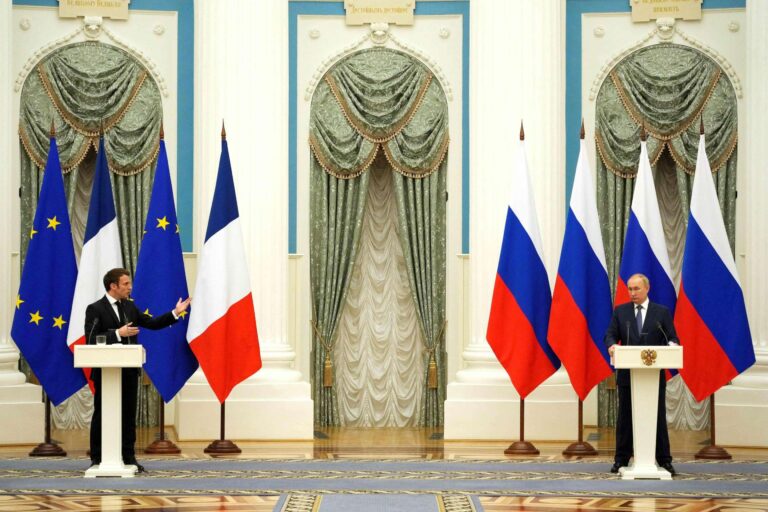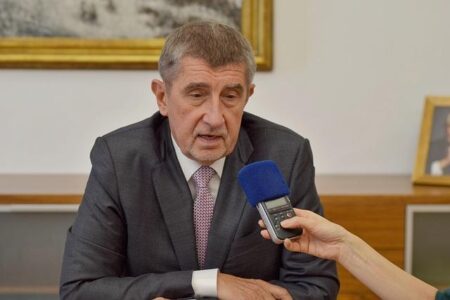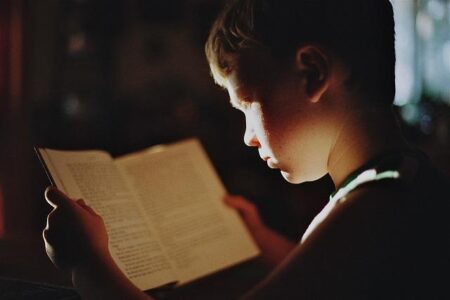In a sharp escalation of diplomatic tensions, Russia has responded vehemently to remarks made by French President Emmanuel Macron, who recently referred to President Vladimir Putin as an “ogre.” This characterization, delivered amid ongoing discussions about the conflict in Ukraine, has sparked outrage from Moscow, with officials condemning the comment as a dangerous oversimplification of a complex geopolitical landscape. The exchange highlights the growing strain in relations between Russia and Western nations, as leaders grapple with both rhetoric and reality in a divided world. As the fallout from Macron‚Äôs remarks unfolds, the implications for international diplomacy and security remain significant.
Russia Responds Strongly to Macron’s Ogre Remarks Amidst Tensions
In a fiery rebuke, Russian officials have condemned French President Emmanuel Macron’s recent characterization of President Vladimir Putin as an “ogre.” Kremlin spokesperson Dmitry Peskov labeled the remarks as “unacceptable,” underscoring the deteriorating diplomatic relations between Moscow and Paris. This incident highlights the increasing strain on the already fragile ties, further aggravated by ongoing geopolitical tensions and military posturing. Peskov’s comments were echoed by various Russian lawmakers who encouraged a robust diplomatic response to Macron’s inflammatory rhetoric.
As tensions escalate, analysts highlight the implications of such remarks on future negotiations and international dialogue. The exchange raises questions about the effectiveness of diplomacy, especially as both nations face challenges related to security, energy, and trade. Key points emphasized by Russian officials include:
- Reassertion of National Dignity: Russian leaders stress the importance of mutual respect in international relations.
- A Call for Constructive Dialogue: Emphasizing the need for open discussions to address their differences.
- Potential for Escalating Propaganda: Concerns about how such language could fuel anti-Western sentiments within Russia.
Analysis of the Political Ramifications of Macron’s Criticism of Putin
Emmanuel Macron’s characterization of Vladimir Putin as an “ogre” has sent ripples through the diplomatic community, highlighting the shifting contours of international relations. This symbolic language not only reflects Macron’s personal stance but also serves as a pivotal moment in European diplomacy. By publicly condemning the Russian president, Macron aims to consolidate support among NATO allies who are increasingly concerned about Russia’s assertive posture. This could lead to a united front, bolstering economic sanctions and military cooperation. However, such remarks risk escalating tensions and complicating direct dialogue with Russia, potentially sidelining diplomatic resolutions.
The political ramifications of Macron’s comments are multifaceted, raising questions about the future of Franco-Russian relations. As tensions mount, several factors come into play:
- Increased NATO Unity: Macron’s remarks may bolster solidarity among Western allies.
- Potential Backlash: Russia may respond with diplomatic or economic measures against France.
- Impact on European Security: The rhetoric could influence defense strategies across Europe.
| Consequences | Potential Outcomes |
|---|---|
| Strained Diplomatic Channels | Reduced dialogue with Russia |
| International Isolation of Russia | Heightened economic sanctions |
| Military Readiness in Europe | Increased defense spending |
Diplomatic Strategies to Mitigate Escalation Between France and Russia
In the wake of President Macron’s provocative remarks labeling President Putin as an “ogre,” escalating tensions between France and Russia have necessitated a careful reevaluation of diplomatic strategies. To mitigate further deterioration of relations, several key approaches could be considered, including:
- Backchannel Communications: Establishing discreet channels for dialogue to facilitate understanding and reduce the risk of misunderstandings.
- Cultural Exchange Initiatives: Promoting programs that emphasize shared history and cultural interests to foster mutual respect.
- Joint Diplomatic Efforts: Collaborating on international issues that require a consensus, such as climate change and terrorism, to build common ground.
Furthermore, it is essential for both countries to engage in constructive dialogue that avoids inflammatory rhetoric. An emphasis on pragmatic issues, particularly in light of rising geopolitical tensions, can create opportunities for reconciliation. Implementing open forums and bilateral discussions focused on areas of cooperation will be vital. Moreover, a proposed framework for scheduled meetings could be established to ensure consistent engagement. The following table summarizes potential diplomatic avenues:
| Strategy | Description | Expected Outcome |
|---|---|---|
| Backchannel Communications | Secret dialogues between aides to prevent escalation. | Reduction of inflammatory rhetoric. |
| Cultural Exchange Initiatives | Promoting mutual cultural understanding. | Strengthened interpersonal ties. |
| Joint Diplomacy | Working together on global issues. | Increased collaboration and trust. |
Recommendations for Constructive Dialogue in European-Russian Relations
Amid escalating tensions following President Macron’s remarks calling President Putin an “ogre,” fostering constructive dialogue between Europe and Russia has never been more critical. To navigate the complex landscape of diplomacy, stakeholders should consider the following key strategies:
- Open Channels of Communication: Establish regular diplomatic dialogues to address misunderstandings and cultivate a mutual understanding.
- Cultural Exchanges: Promote programs that encourage engagement between European and Russian citizens, including art exhibitions and academic partnerships.
- Focus on Common Interests: Identify shared challenges, such as climate change and security issues, to build collaborative frameworks for action.
Additionally, leveraging multi-national platforms might serve as an effective way to diffuse tensions. A coordinated approach could involve:
| Strategy | Possible Outcomes |
|---|---|
| Host Joint Summits | Facilitate direct conversations and reduce inflammatory rhetoric. |
| Media Collaboration | Encourage balanced reporting to counteract propaganda and misinformation. |
| Track II Diplomacy | Engage non-governmental organizations in dialogues to ease political pressure. |
Insights and Conclusions
In conclusion, the escalating war of words between French President Emmanuel Macron and the Kremlin underscores the deepening rift between Russia and Western nations in the wake of ongoing geopolitical tensions. By denouncing Macron’s characterization of President Vladimir Putin as an “ogre,” Russian officials have further cemented their stance against perceived Western provocations. As diplomatic exchanges become increasingly fraught, the potential for miscommunication and conflict remains high. With both sides holding firm to their narratives, the international community will be closely watching how these tensions evolve and what implications they may hold for future diplomatic relations.




